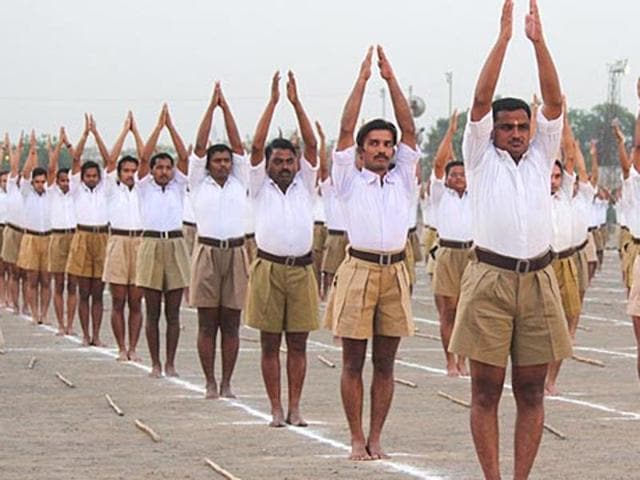RSS’ medal of honour: Hindutva in the garb of nationalism
The ideological mentor of the BJP seems to have found a credible, honourable way of spreading its influence -- repacking Hindutva as nationalism.
Reverberations of “anti-India” slogans shouted at the Jawaharlal Nehru University on a cold February night can be felt across the Aravalli Range-- from the Delhi Ridge which houses the campus to the dry plains of Nagaur in Rajasthan.

At a crucial annual meeting of the Rashtriya Swayamsevak Sangh (RSS), the ideological mentor of the BJP, the campus unrest, being read as “anti-national activities”, is not going unnoticed. Heads shake in disapproval and conversations quickly escalate into a discourse on nationalism and morality at the mere mention of the university.
The RSS, with its sharp position vis-à-vis JNU and students’ activism is not new to Nagaur, where the conclave started on Friday. But this time, there is a renewed interest in right-wing ideology.
The RSS’ clarion call for protecting the “nation” seems to have found resonance with the people in the state and outside. Evidence of its growing clout is the number of shakhas (branches where the cadres meet) that have risen from 51,355 in 2015 to 56, 859 in 2016. Footfall at its shakhas too has shown a marked increase.
If it was the Ram Temple in Ayodhya that became the point of convergence for Hindus in the 90s, the Sangh has now picked “nationalism”, a euphemism for Hindutva to forge links.
Statements dotted with expressions like “desh prem” (love for the country) and “desh bhakti” (allegiance to the country) lead to easy conversations and an acceptance of right-wing ideology.
Sanjay (name changed) drives a taxi and routinely ferries tourists from the dargah of Sufi saint Khwaja Moinuddin Chisti or Garib Nawaj in neighbouring Pushkar, where the originator of the Hindu trinity, Lord Brahma, is said to have performed a grand yajna. Sanjay says Ajmer is known for its composite culture and remains largely unaffected by skirmishes between people of both religions; but now he’s interested to know what the RSS has to offer.
His introduction to the RSS was limited to its role in “promising a Ram Temple” but now he wants to learn more because he wants to be “prepared”.
“The RSS is right in saying that if anti-India slogans could be raised in Delhi, then what stops the enemy from entering our house,” he says. His definition of enemy is Pakistan.
At the Ajmer railway station, a former Naval official expresses surprise that students in a prestigious university would want “India’s disintegration”. Now an employee of the state’s tourism department, he has been following the news and while he was aware of the doctored videos, of the students’ right to protest, of freedom of expression; he cannot grasp the “leniency” shown to those who support “disloyalty for the nation”.
He supports the RSS’ calls for strict action by the government against universities that are “hotbeds of anti-national activities”.
Sedition charges slapped on students accused of shouting anti-national slogans are appropriate, he says. “Country-first, that’s what the Navy taught me.”
His wife, who can prolifically quote actor Anupam Kher’s speech at a recent debate, makes no bones about the fact that the JNU issue has given the RSS a peg to hang its Hindutva agenda. Unlike her husband who says his support for the RSS is limited to its cause for nationalism, she says the outfit is giving Hindus a chance to be heard.
“Acha hai, Anupam Kher aur RSS ne Hindu ko awaz di…kaha, tum bolo, bedar ho ke bolo,” (Anupam Kher and the RSS have given the Hindus courage to speak out without fear) was her emphatic response.
In Nagaur, there is a feverish rush to hear the Sangh Parivar’s message for the Hindus. Over-sized posters welcoming BJP party president Amit Shah, who is expected at the meet, appear everywhere but the attention is on what RSS chief Mohan Bhagwat will say.
“Hindus are peace loving, they don’t fight. But now there is a threat to the nation. The opposition parties in trying to pull down Modi (PM Narendra Modi) are sowing the seeds of anti-nationalism. I am not an RSS member, but what they say is correct. As Indians we must learn to crush those who destroy the nation,” says Rajesh who works as a concierge in a hotel.
And this is perhaps what the RSS wants to hear as well. Its invocation to nation seems to have found takers.
Even though the BJP is relying on the RSS and its network of trusted foot soldiers to make an impact in the forthcoming state assembly elections – after the drubbing in Delhi and Bihar -- the Sangh Parivar is most interested in increasing its own footprint.
And to do so, it seems to have found a credible, honourable way, repacking Hindutva as nationalism.





